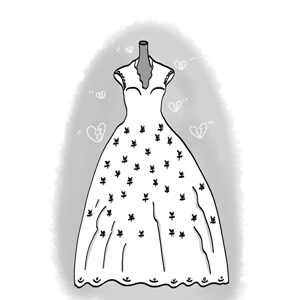Does my wallet look big in this?

World-famous fashion designer Vera Wang opened her first-ever mainland store last week, a boutique bridal shop at Xintiandi in Huangpu district. Blushing brides who have previously walked down the aisle in a "Vera Wang" include Mariah Carey, Victoria Beckham, Jennifer Lopez and Kate Hudson.
For the New York-born couturier - whose parents are both from Shanghai - this should have been a triumphant homecoming, of sorts.
Instead, it has left many fashion fans incensed after the designer announced that every potential customer at the Shanghai store will be charged 3,000 yuan ($482) simply to try on the gowns for sale. The store further added that each customer will be given a 90-minute slot to try on dresses. If a purchase is made, the deposit will be deducted from the sale price, but otherwise it is non-refundable. Potential customers have also been warned that they should give the store "several weeks" notice if they would like to make an appointment.
No one would really argue that 3,000 yuan is very much money for the kind of bride-to-be who is seriously considering purchasing a designer gown from Vera Wang. To put the amount into perspective, the store will showcase some 80 custom-made gowns at prices ranging from 30,000 yuan to 300,000 yuan.
But the point is that this is the only worldwide outlet of the fashion house that imposes this rule.
A clue as to the possible real reason behind this decision is revealed in a public statement by the company to the effect that, rather than discriminating against customers, the aim is to "protect the copyright of the designer." The release also states that customers will be barred from taking photos or filming at the store.
China is notorious for copyright infringements of all kinds, and not only in the fashion industry. And the store would seem to be doing all in its power to protect its trademarks and designs.
People may complain that if Vera Wang doesn't trust her Chinese customers, then she shouldn't be setting up shop here in the first place, but like any business, she has the right to serve - or refuse - any customer she wishes.
Of course the store will spin it that they want to maintain an air of luxury and exclusiveness in the store by only allowing in truly serious customers.
The truth is that we have been here before. Last year, Dolce & Gabbana suffered a public relations nightmare when they physically prevented shoppers from photographing the window displays at their flagship Hong Kong store. One can only assume this action was because of similar concerns about copyright protection. But the ensuing bad press forced the luxury brand into making a humiliating apology, and one that did nothing for its public image.
Vera Wang would seem to be courting the same kind of opprobrium. Or is she? Many netizens have already denounced the decision as discrimination against Chinese people. If the story refuses to die down, Wang may try to refute such charges of prejudice by pointing out that she herself is ethnically Chinese, a scion of our own fair city, no less. We shall see.